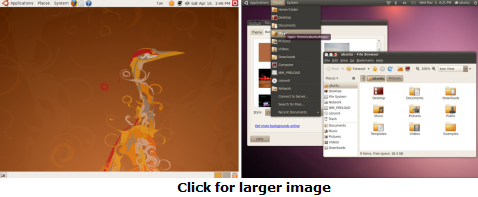Ubuntu gets a facelift: More appealing to the first time user?

When I started using Ubuntu, granted the first time was when I went open-source for a full 48 hours, the interface was dark, a little depressing, and reminded me of a depressing sewage works. But not anymore.
The new user interface - though not radically overhauled - reminds me of the transition between the vibrant, fauvist-style blue XP interface, to the see-through and transparent Vista interface.
Ubuntu 10.04 will be the next major version of the popular open-source operating system. This refresh may be indicative of the creators being more user interface and experience aware, and with a new logo and branding mechanism, this looks more like a brand overhaul as well as a new-look operating system.
But, for the first time user, it breaks me to say that this isn't enough.
Adrian Kingsley-Hughes highlights most of the reasons, from little or OEM support to the end user, no gaming support and the distribution differences. But there are more that worries me.
There is still a load of confusion aired over drivers, hardware support and installations. The in-built software center makes it relatively easy to install a set amount of programs and applications, but the wider aspects from basic Windows use would cause the first time user to struggle.
The initial hump from overcoming the Windows obsession will be far too difficult for many - the simpler things rather than anything else. The addiction we have to Microsoft technology isn't necessarily a bad thing but it only works if you can get your hit - whether it be a money issue or an availability issue.
Improving boot-up times or the installation experience, even to tweaking the lighting and the overall user interface isn't enough. Linux is still a niche market and students aren't gusty enough to embrace it yet without a real killer feature or alignment to what they are already used to.
